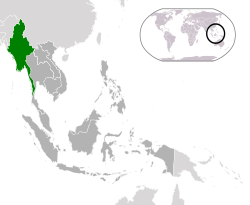Jalan Burma Menuju Sosialisme
Union Burma (1962–1974) ပြည်ထောင်စု မြန်မာနိုင်ငံတော် Pyidaunzu Myăma Nainngandaw Republik Sosialis Uni Burma (1974–1988) ပြည်ထောင်စု ဆိုရှယ်လစ်သမ္မတ မြန်မာနိုင်ငံတော် Pyihtaunghcu Soshallaitsammat Myanmar Ninengantaw | |||||||||
|---|---|---|---|---|---|---|---|---|---|
| 1962–1988 | |||||||||
 | |||||||||
| Ibu kota | Rangoon | ||||||||
| Bahasa yang umum digunakan | Burmese | ||||||||
| Agama | Buddhism | ||||||||
| Pemerintahan | One-party socialist state under a totalitarian military dictatorship | ||||||||
| President | |||||||||
• 1962–1981 (titled as Chairman of the Union Revolutionary Council until 1974) | Ne Win | ||||||||
• 1981–1988 | San Yu | ||||||||
• 1988 | Sein Lwin | ||||||||
• 1988 | Aye Ko (acting) | ||||||||
• 1988 | Maung Maung | ||||||||
| Prime minister | |||||||||
• 1962–1974 | Ne Win | ||||||||
• 1974–1977 | Sein Win | ||||||||
• 1977–1988 | Maung Maung Kha | ||||||||
• 1988 | Tun Tin | ||||||||
| Era Sejarah | Cold War | ||||||||
| 2 March 1962 | |||||||||
| 18 September 1988 | |||||||||
| Luas | |||||||||
| 1974 | 676.578 km2 (261.228 sq mi) | ||||||||
| Mata uang | Kyat | ||||||||
| Kode telepon | 95 | ||||||||
| Kode ISO 3166 | MM | ||||||||
| |||||||||
| Sekarang bagian dari | Myanmar | ||||||||
Jalan Burma Menuju Sosialsme (bahasa Burma: မြန်မာ့နည်းမြန်မာ့ဟန် ဆိုရှယ်လစ်စနစ်) mengacu kepada ideologi pemerintahan sosialis di Burma, dari tahun 1962 hingga 1988, ketika kudeta tahun 1962 yang dipimpin oleh Ne Win dan militer melengserkan U Nu dari kekuasaan. More specifically, the Burmese Way to Socialism is an economic treatise written in April 1962 by the Revolutionary Council, shortly after the coup, as a blueprint for economic development, reducing foreign influence in Burma and increasing the role of the military.[1] The military coup led by Ne Win and the Revolutionary Council in 1962 was done under the pretext of economic, religious and political crises in the country, particularly the issue of federalism and the right of Burmese states to secede from the Union.[2]
Lihat pula
Referensi
- ^ Holmes, Robert A. (1967). "Burmese Domestic Policy: The Politics of Burmanization". Asian Survey. University of California Press. 7 (3): 188–197. doi:10.1525/as.1967.7.3.01p0257y. JSTOR 2642237.
- ^ Aung-Thwin, Maureen; Thant, Myint-U (1992). "The Burmese Ways to Socialism". Third World Quarterly: Rethinking Socialism. Taylor & Francis, Ltd. 13 (1): 67–75. JSTOR 3992410.
Sumber lainnya
- Revolutionary Council (28 April 1962). "THE BURMESE WAY TO SOCIALISM". Information Department for the Revolutionary Council. Diakses tanggal 22 August 2010.
- Burma---Growing Ever Darker Foreign Policy in Focus, 11 September 2007.
Pranala luar
- Nick Thompson of Stanford on Burma
- Feb 1996 report on Myanmar by the UN Commission on Human Rights
- Original article from the Revolutionary Council



